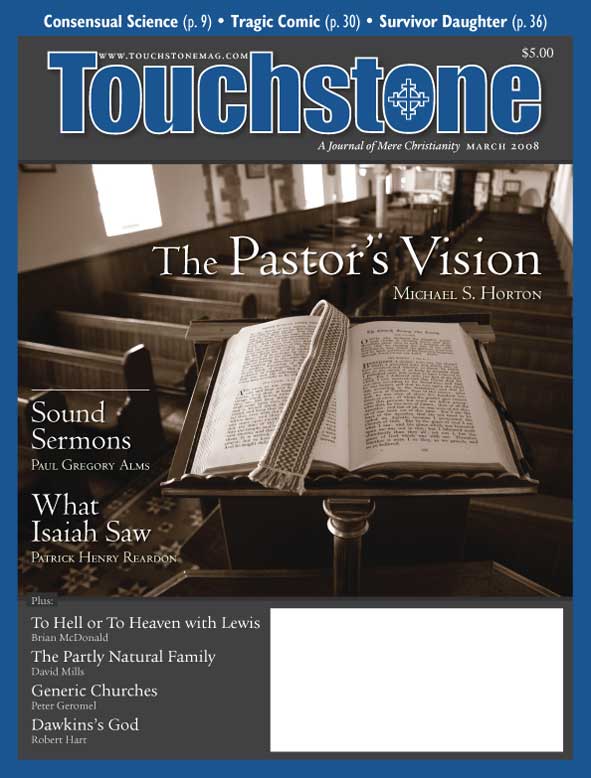Book Review
Philosopher’s Tome
The Tasks of Philosophy:
Selected Essays, Volume1
Ethics and Politics:
Selected Essays, Volume 2
by Alasdair MacIntyre
Cambridge University Press, 2006
(Vol. 1: 248 pages, $24.99, paperback;
Vol. 2: 252 pages, $25.99, paperback)
reviewed by Stewart Goetz
The problem for a reviewer of almost 500 pages of Alasdair MacIntyre’s stimulating essays is deciding which to summarize and comment on. Because he incisively discusses and critiques the reigning philosophical orthodoxy in both the academy and the public square today (what is usually referred to as “naturalism”), I will devote this brief review to his thoughts about it.
MacIntyre, presently Senior Research Professor at the University of Notre Dame, is a member of the American Academy of Arts and Sciences, a Fellow of the British Academy, and the author of many books, including the classic After Virtue.
The Tasks of Philosophy and Ethics and Politics contain a treasure of 22 essays, written from 1972 to 2002, on a wide variety of subjects in metaphysics, ethics, and politics, including chapters about first principles, the ends of life, moral relativism, natural law, and toleration.
Lost Questions
MacIntyre’s approach to these subjects is characteristically Aristotelian/Thomist in nature, and his depth of insight about issues in modern philosophy makes these works well worth the read (though, reader beware, the read is not always easy).
As MacIntyre makes clear in his response to Pope John Paul II’s encyclical letter Fides et Ratio, one, if not the primary, task of philosophy is to articulate and pursue answers to questions posed by human beings about the nature of the world and our place in it. “We move towards that truth by asking what, if anything, the meaning of our lives is.”
He believes that the majority of philosophers today all too often imprison their readers within their own textual world because they do not inquire about a world (and the ends of human life) separate from and uninterpreted by their texts. “The world becomes text-as-interpreted-by-so-and-so.”
Members of the philosophical majority develop philosophies that reduce all questions, including those concerned with the truth about the purpose of life, to “technical or semi-technical questions” about what truth and life are. Philosophy for them is primarily and sometimes exclusively the “exercise of a set of analytic and argumentative skills” for its own sake.
Though some philosophers, for example those in the Aristotelian/Thomist tradition, manage “to send us from the text back into encounter with the world about which the text speaks,” they are a minority. How did philosophy reach the point where texts are the world and questions about the meaning of our lives are lost?
As MacIntyre analyzes the situation, the explanation must include the topic of first principles. “Nothing is more unacceptable in recent philosophy than any conception of a first principle” universal in scope in the sense that it is not “relativized to social contexts and individual purposes.” The exclusion of universal first principles is closely related to the complete elimination of the concept of a goal or end, a telos, because
Genuinely first principles . . . can have a place only within a universe characterized in terms of certain determinate, fixed and unalterable ends, ends which provide a standard by reference to which our individual purposes . . . and decisions can be evaluated as well or badly directed.
In short, philosophers for the most part stopped writing about the world and the meaning of our lives in that world because the idea of a meaning for our lives presupposes a goal, end, or purpose, a telos or finis for our lives as well, which might or might not be accomplished or fulfilled by the decisions we make and carry out. If there are no goals, ends, or purposes of any kind, there can be no point in writing about the meaning of our lives, because the meaning of our lives is inextricably related to their end or goal.
Self-Defeating Orthodoxy
When all is said and done, there is for contemporary practitioners of philosophical orthodoxy one and only one first principle, namely, that there are no first principles. But as MacIntyre points out, this rejection of first principles is itself a first principle.
Modern philosophical orthodoxy is, therefore, inconsistent and self-defeating. But though inconsistent and self-defeating, it, like almost all other philosophical orthodoxies in the past, has become so well established “that to those under its influence rival voices [have become] inaudible.”
Is there any way for those who believe in first principles and a telos/ finis of human life to gain a hearing with those who will have nothing to do with such concepts? MacIntyre believes that one way is to make clear that any narrative the latter might write about how they have arrived where they are philosophically would have to be told in terms of their attempts to find philosophical and epistemological first principles.
“Where the Thomist sees stages in a movement away from adequate conceptions of truth and rationality, stages in a decline,” he writes, “the protagonists of the dominant standpoints in contemporary philosophy, so it will be said, will see stages in an ascent, a movement towards—but the problem is: towards what?” If they can answer this question, they will have presupposed “just that type of teleological ordering of enquiry the rejection of which is central to the whole modern philosophical enterprise.”
Implausible Orthodoxy
MacIntyre’s argument against the contemporary philosophical establishment and for the reality of teleological explanations of human activity is surely correct. It is self-defeating to purposefully argue that there are no purposes.
In closing, I will employ some of MacIntyre’s thoughts about the human body to extend one step further his argument against contemporary philosophical orthodoxy. As he notes, the human body’s specific powers are, in the first instance, capacities for exercising movement, and we use them to perform bodily actions to accomplish our purposes.
If, however, contemporary philosophical orthodoxy is correct, it must explain all our intentional bodily actions without reference to a telos. This means that when the orthodox type out their defenses of the non-teleological worldview, their moving fingers can be completely explained in terms that do not mention their purpose in writing. Can one think of anything more implausible or ridiculous than that?
In the end, as MacIntyre maintains, any philosophical attempt to expunge teleology from our lives and the world we inhabit can only be adequately explained and described in terms of the teleology that it seeks to expunge. Given the reality of teleology, readers would greatly enrich their lives if they made it their purpose to read and learn from Alasdair MacIntyre. •
subscription options
Order
Print/Online Subscription

Get six issues (one year) of Touchstone PLUS full online access including pdf downloads for only $39.95. That's only $3.34 per month!
Order
Online Only
Subscription

Get a one-year full-access subscription to the Touchstone online archives for only $19.95. That's only $1.66 per month!
bulk subscriptions
Order Touchstone subscriptions in bulk and save $10 per sub! Each subscription includes 6 issues of Touchstone plus full online access to touchstonemag.com—including archives, videos, and pdf downloads of recent issues for only $29.95 each! Great for churches or study groups.
Transactions will be processed on a secure server.
more from the online archives
calling all readers
Please Donate
"There are magazines worth reading but few worth saving . . . Touchstone is just such a magazine."
—Alice von Hildebrand
"Here we do not concede one square millimeter of territory to falsehood, folly, contemporary sentimentality, or fashion. We speak the truth, and let God be our judge. . . . Touchstone is the one committedly Christian conservative journal."
—Anthony Esolen, Touchstone senior editor









